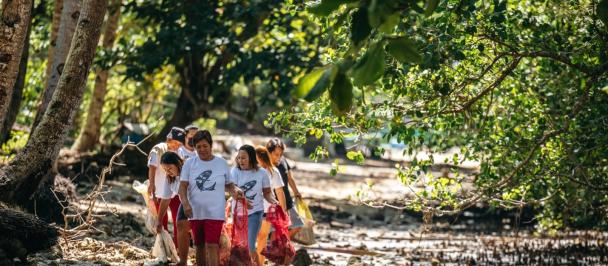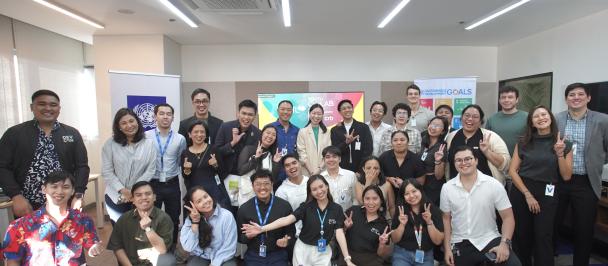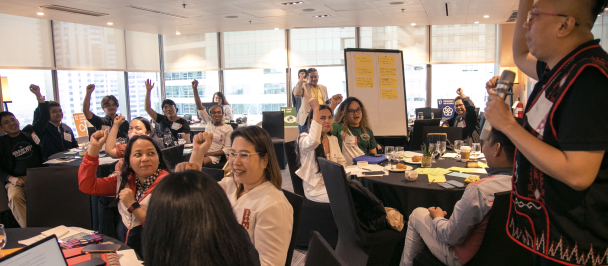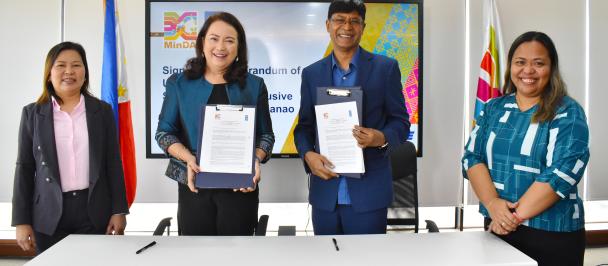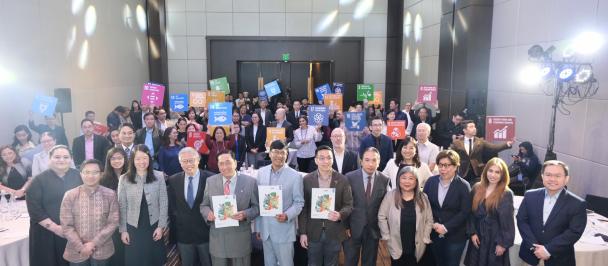DOH, UNDP strengthen healthcare waste management in Metro Manila; vow continued support
March 28, 2023
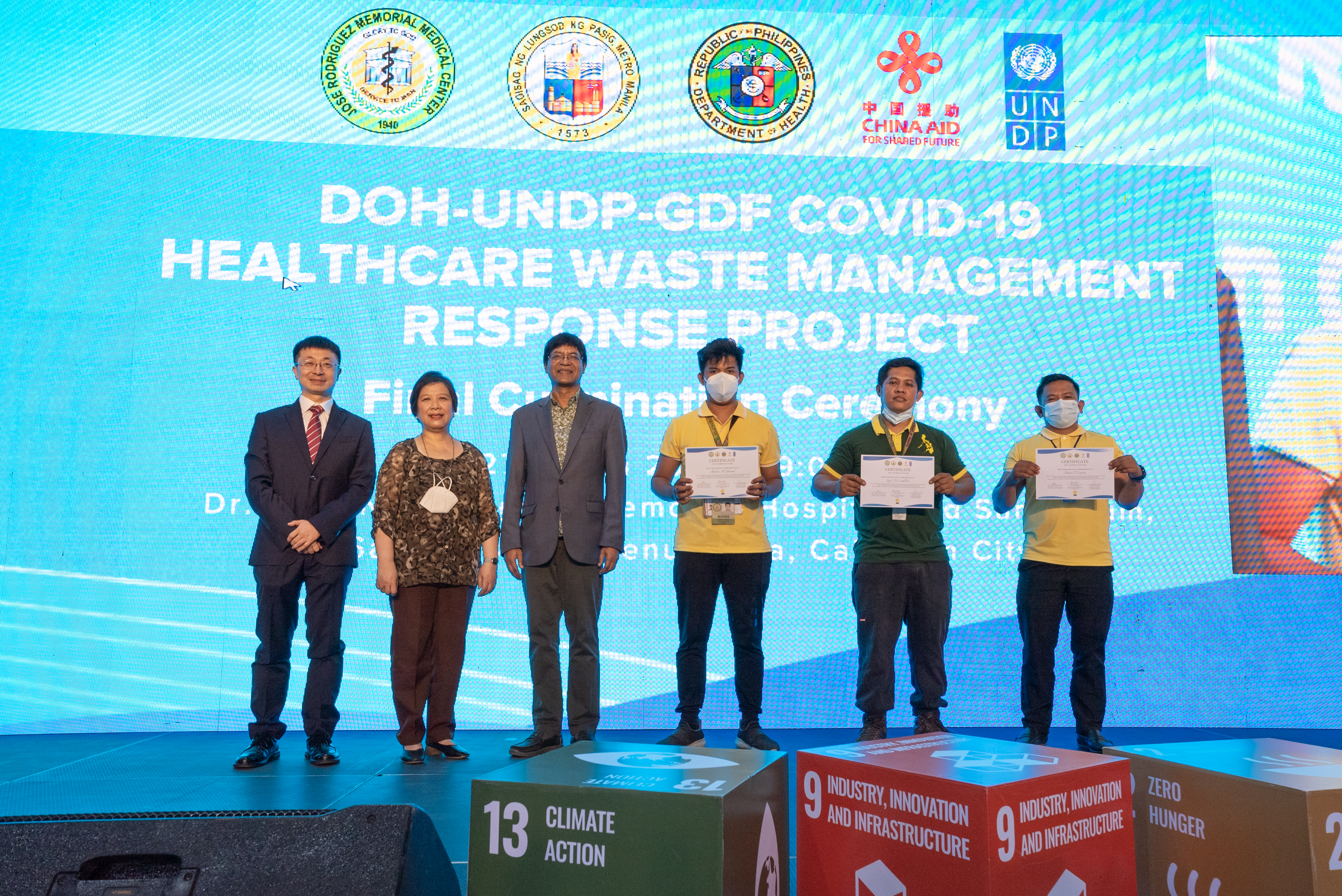
Minister Councilor Yang Guoliang, Chinese Embassy, DOH Assistant Secretary Gloria Balboa, and UNDP Philippines Resident Representative Dr. Selva Ramachandran presented the completion certificates to health workers from DJNRMHS and PCGH
Metro Manila, Philippines – Over 200 hospital workers in Metro Manila completed training courses on responsible and sustainable healthcare waste management, and two medical autoclave units were handed over to partner hospitals as part of the DOH-UNDP-GDF CoVID-19 Healthcare Waste Management (DOH-UNDP-GDF HCWM) Response Project.
In the project’s culmination activity in Caloocan City, graduates of the healthcare waste training program received their course completion certificates presented by Department of Health (DOH) Assistant Secretary Dr. Gloria Balboa, United Nations Development Programme (UNDP) Philippines Resident Representative Dr. Selva Ramachandran, and Chinese Embassy in the Philippines Minister Councilor Yang Guoliang.
Following the handover ceremony last December 2022, medical autoclaves have been successfully set up and tested in Dr. Jose N. Rodriguez Memorial Hospital and Sanitarium (DJNRMHS) and the Pasig City General Hospital (PCGH). Hospital personnel finished their week-long practical training in preparation for the full operation of the donated medical waste management equipment and underwent comprehensive learning sessions conducted by UNDP and the DOH-Metro Manila Center for Health Development (MMCHD) Office on a new and improved waste management system that will be implemented in the two health facilities in the coming months.
The DOH recognized the significance and timeliness of the project. “The importance of healthcare waste management in these unprecedented times was underlined with the help of our partners. We were able to effectively implement this project and replicate the best practices in waste management. It is essential that effective healthcare waste management is a crucial public health service. Only an enabling environment will ensure that this is carried out continuously and successfully,” said Assistant Secretary Balboa.
Dr. Ramachandran looks forward to even better and greater partnerships between UNDP, the government, and development partners. “This culmination, rather than an end, is a celebration of new beginnings: the beginning of better health care waste management for our partner-beneficiaries, the beginning of new and more efficient waste management processes that can be scaled up in other hospitals—both public and private—or even expanded to reinforce other sectors and initiatives such as Circular Economy, among others,” he said in his message.
Minister Councilor Guoliang expressed appreciation to the partners for their efforts and dedication in delivering the project. He also warmly congratulated the health workers who have finished the training courses. “You will play significant roles in improving the health waste management capability of the Philippines,” he stated.
With technical support from Healthcare Without Harm, health workers from DJNRMHS and PCGH learned waste audit, characterization, and the fundamentals of the waste management process. They were also provided with tablet devices to familiarize themselves with digital waste registry and taught how to use digital tools for faster and more efficient waste management record keeping.
“This project has been such a real blessing to us at the time it was really needed, which was during the pandemic. This would also entail that focusing on the leveling up of our hospital’s waste management system would also mean upgrading the standard quality of service we provide to our patients,” shared Nocielta Garcia-Castillo, DJNRMHS Designated Planning Officer.
Apart from DOH, UNDP has also sought the support of the Department of Environment and Natural Resources (DENR) on ways the project can drastically reduce the volume of infectious medical waste produced in the partner hospitals.
The project comes to a close as the Philippines eases into the new normal, coming from a global health crisis. With the technical support and equipment provided, the project aims to bring the country closer to achieving a sustainable waste management system to help protect the health of the exposed population and prevent environmental pollution. It also seeks to share the best practices with other institutions in Metro Manila and eventually nationwide. The partners committed to build on the momentum of the project to continue supporting the health sector, with plans to generate a new expanded package of support.
The DOH-UNDP-GDF CoVID-19 Healthcare Waste Management Response Project was made possible through the support of China’s Global Development and South-South Cooperation Fund (GDF) operated by the China International Development Cooperation Agency (CIDCA). ##

 Locations
Locations